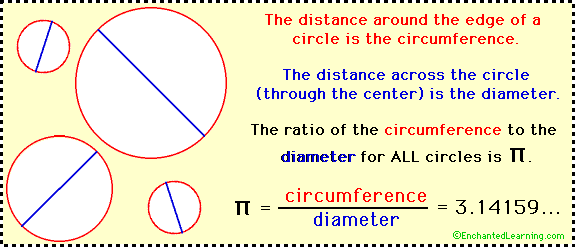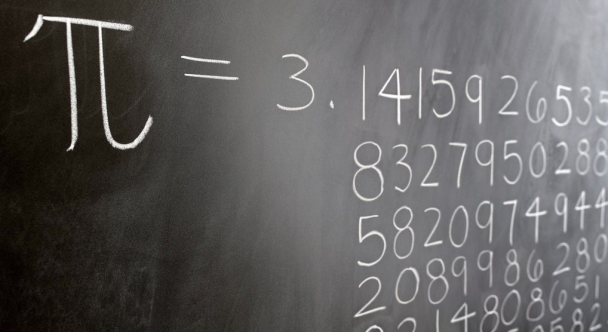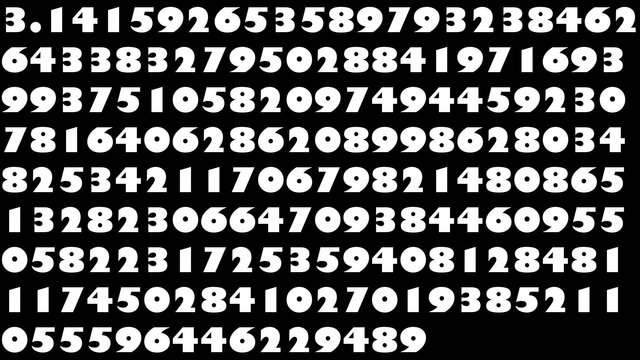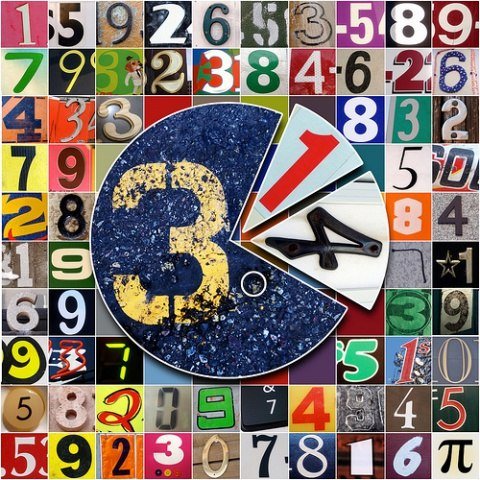Pi - The most mysterious number in the world
The pi digit – is the ratio of the circumference to its diameter, the most famous and ancient mathematical constant. It is useful not only in geometry and engineering - pi arises in all mathematical and physical theories; simply because the circle (the set of points equidistant from a given) is used even in fields that are far from the scientific fields of geometry - in complex analysis, probability theory, digit theory.

In most cases, scientists need to know only that pi – is a positive digit. Some amazing features of this digit are much more interesting for mathematicians. For example, the fact that pi - an irrational digit - it can’t be represented as a fraction - in the decimal description of pi there is an infinite number of digits, and there are no periodic repetitions.

Oddly enough, except that the decimal representation of pi is infinite and aperiodic, there is little we can say more about it. Often you can hear that in the description of pi on any sufficiently distant place there is a preassigned finite digit. Actually, it is unknown whether it is so. Moreover, we do not even know whether any digit is repeated in the description of the pi infinite digit of times: it is possible that starting from a very distant position in the description there will be, for example, only zeros and ones.

In ancient times, the length of the perimeter of polygons inscribed in a circle was calculated. Using this method, Archimedes correctly found the first three digits of this constant - 3.14. However, near the XV century, people began to use a much more efficient way - representation of pi as the sum of an infinite series, the addition of an increasing digit of the first members which gives the most accurate value of pi. Perhaps the simplest of these series – is a series of Leibniz:

However, it "slowly converges" - to calculate the next digit is necessary to add more members. Over the past century there were many other - much faster converging series, allowing finding an approximate value of pi and calculating its regular digits; Race of Records in calculating of pi, as a result, turned into a race of inventing new formulas, and since the 1950s – it became even the race of processing powers of computers.
The last record was registered in October 2014: an anonymous enthusiast with the nickname houkouonchi found on a standard PC with a processor capacity of 2.6 GHz 13,300,000,000,000 (13.3 trillion) pi digits. The calculation itself took 208 days and 182 hours to check the result. Houkouonchi used to calculate the y-cruncher algorithm, invented by the American mathematician Alexander Yee.

It is curious that from the end of 2009 the records were reached precisely on ordinary PCs. On the one hand, it is a consequence of the increase of their power. On the other - in a world where a laptop thinks faster than a supercomputer of 20 years old, excitement to the calculation of pi significantly fallen.
A rivalry peaked in the 1980s - 1990s: over the past two decades, a record of calculating pi increased from two million digits to 200 billion. The main competitors were Japanese Yasumasa Canada and American mathematician brothers David and Gregory Chudnovsky. At the same time, a professor from Tokyo University used industrial supercomputer Hitachi SR8000, while Chudnovsky brothers were doing calculations on a makeshift computer m zero. The car was built on the money of their wives, one of whom worked as a lawyer, and the second - an officer in the United Nations. The supercomputer took the whole room, it was cooled by 25 household fans and cost about 70 thousand dollars and worked faster than many commercial supercomputers that cost tens of millions of dollars.

However, Chudnovsky relied not only on a supercomputer, they also invented an extremely effective formula, which was named Chudnovsky algorithm, and later used to establish the first record on the PC by Fabrice Bellard. The formula of Chudnovsky is not as simple as a series of Leibniz, but counts much faster:

People involved in the computation of pi for two millennia and this work hasn’t got much use now. If you need to calculate the length of the visible universe accurate to size of the proton, it is enough to know only 39 digits of pi: 3.1415926535 8,979,323,846 2,643,383,279 50,288,419 - and they were known in the middle of XVII century.
For any application or physical calculations (taking into account the technical level of modern devices) you do not need to know more than a few hundred digits of pi - the first 500 of which mankind has already received in 1895. We can assume that around this time the calculation of pi has become a sport, that hasn’t got a practical significance.
Follow me, to be the first to learn about my publications devoted to popular science and educational topics
With Love,
Kate
Так лучше

Like this gif as it's pretty descriptive
I'll just leave this here.
Все прекрасно, только пи это не цифра (digit), а число (number) :)
Согласна. Спасибо за правку)
Да не за что. Ты смотри там осторожнее с математическими терминами, все-таки статьи обучающие :) С сильной математикой ничего подсказать не смогу, но тут просто ухо резануло :)
И очень советую гуглить общепринятую в англоязычных странах терминологию. Мой друг, проф. переводчик, несмотря на свои супер-навыки при переводах постоянно этим занимается. Очень легко ошибиться.
208 days to check the result... that is amazing!
For particle physics calculations, O(10) digits is fine, and factors of pi arise everywhere!
Thanks for sharing!
mm, interesting. Didn't know that. What programming language do u use for calculations? Fortran?
Usually, I use a python interpreter driving a core either in Fortran or in c++, regarding the tasks that must be done.
hello @krishtopa, I'm just stopping back to let you know that your post was one of my favourite reads for yesterday that I posted this morning. You can read what I had to say here
wow, thanks @shadowspub. very pleased to hear that
This is really good, in fact so great I wont upvote until 24 hours regaining full voting power.. This is infinite! :D
Hi, @christoryan
Thank you for the feedback. I do my best to share interesting facts and develop #popularscience rubric on Steemit
Hi! Very interesting post :) If you want take a look at my new post about a guy who make a song with the Pi number! https://steemit.com/music/@juanmiguelsalas/how-the-number-pi-sounds-on-a-piano
This post has been linked to from another place on Steem.
Learn more about linkback bot v0.4. Upvote if you want the bot to continue posting linkbacks for your posts. Flag if otherwise.
Built by @ontofractal